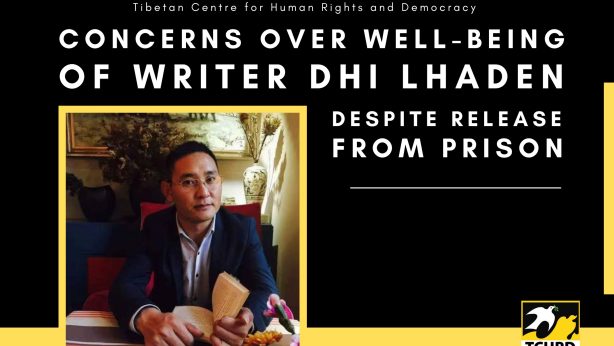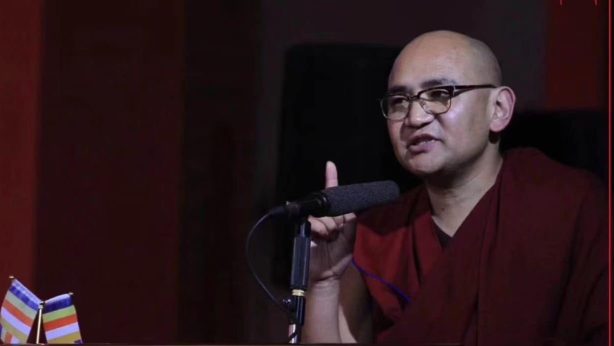Prominent Tibetan writer, teacher and environmentalist Kunchok Tsephel released after more than 13 years in prison
The Tibetan Centre for Human Rights and Democracy (TCHRD) has learned about the release of Tibetan writer, teacher and environmentalist Kunchok Tsephel on 18 March after serving more than 13 years at two different prisons including Dingxi near Lanzhou city in Gansu Province. Tsephel’s 15-year prison term had been reduced by almost two years after he saved the life of a fellow prisoner and collected ‘points’ for exhibiting ‘good behaviour’.
TCHRD understands that Tsephel and his family members are under close surveillance given the fact that Tsephel still has to serve the four years’ supplementary sentence of ‘deprivation of political rights’, which allows the police discretionary power to impose extreme restrictions on his movement and activities.
At the time of his detention, Tsephel was working as an environmental officer for the Chinese government. He is known for co-founding the first-ever Tibetan literary website called Chomei (‘Butter Lamp’) with Kyabchen Dedrol, one of the most influential Tibetan poets who led the literary movement known as “The Third Generation of Tibetan Poets”, which is characterised by the “assertion of an independent, individualistic, subjective, and subversive spirit.”
Tsephel had been detained in the early morning hours of 26 February 2009 after his house was ransacked and his computer, camera, and mobile phone seized. The same year on 12 November, he was convicted of “leaking state secrets” and sentenced to 15 years imprisonment in a closed-door proceeding by the Kanlho (Ch: Gannan) Intermediate People’s Court.
Tsephel’s charges were connected to the content on his website and for sharing information outside Tibet regarding the brutality committed by the Chinese People’s Armed Police against Tibetans during the 2008 Uprising.
During nine months of his incommunicado detention, his family members heard nothing about him until they were summoned to court on 12 November to hear the verdict.
A resident of Ngulra Township, Machu (Ch: Maqu) County, Kanlho Tibetan Autonomous Prefecture, Tsephel was born into a nomadic family in 1970 and studied both the Tibetan and Chinese languages. In 1989, he came to exile in India and enrolled at the Tibetan School in Suja, Bir (Himachal Pradesh) where he studied Tibetan and English for three years. He returned to Tibet in 1994 after the completion of his studies. Tsephel’s 2009 arrest was not the first time Tsephel found himself detained at the hands of the Chinese authorities. In the third month of the Tibetan lunar calendar in 1995, the Public Security Bureau officials of Gansu Province arrested Tsephel on questionable grounds regarding his suspected involvement in political activities. All the while professing his innocence, he was kept under custodial detention for two months and was subjected to torture and forced interrogation before being released without charges.
In 1996, Tsephel undertook English and Chinese language studies at Beijing Minzu University. Between 1997 and 1999, he studied English at North West Nationalities University in Lanzhou. In 2004, he was recruited as a Tibetan and English language teacher at the Tibetan Middle School in Machu County, where he received the ‘Best Teacher Award’ for his exemplary service. In 2005, in collaboration with Kyabchen Dedrol, Tsephel started the self-funded website Chomei dedicated to promoting both classical and contemporary Tibetan writings. The website was under strict supervision for many years, and was shut down on numerous occasions in 2007 and 2008.
TCHRD urges Chinese authorities to refrain from imposing arbitrary restrictions on Tsephel and his family members and allow them to seek proper medical care in other places. Like other Tibetan political prisoners, Tsephel was unjustly imprisoned for his courage and determination to protect and promote the Tibetan language and culture. His imprisonment was part of a systematic campaign by Chinese authorities after the 2008 uprising to spread fear and intimidation in Tibet by cracking down on Tibetan intellectuals, writers, and cultural figures. As Chinese authorities accelerate forced assimilation and acculturation campaigns, Tibetan intellectuals and writers are still being targeted and put behind bars without due legal process.


